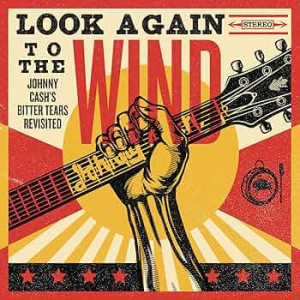 Just the other night I was pondering the question, “which musical act has been most influential on you?” It was asked by a member of an online music community I belong to. I had to say The Beatles, because they changed my life when they came to America in 1964, when I was 9 years old. For second place, though, it’s a tossup between Neil Young and Johnny Cash. And I’d probably have to settle on Johnny. I didn’t discover him until a couple of years after The Beatles, but he taught me a lot about truth and rightness when I was in my formative years. Coincidentally, both Johnny and Neil have a strong affinity for the plight of American Indians. Native Americans. First Nations as they’re called in Neil’s Canadian homeland.
Just the other night I was pondering the question, “which musical act has been most influential on you?” It was asked by a member of an online music community I belong to. I had to say The Beatles, because they changed my life when they came to America in 1964, when I was 9 years old. For second place, though, it’s a tossup between Neil Young and Johnny Cash. And I’d probably have to settle on Johnny. I didn’t discover him until a couple of years after The Beatles, but he taught me a lot about truth and rightness when I was in my formative years. Coincidentally, both Johnny and Neil have a strong affinity for the plight of American Indians. Native Americans. First Nations as they’re called in Neil’s Canadian homeland.
Also coincidentally, the year The Beatles landed in America and on my record player, Johnny Cash released his most controversial and probably least known album Bitter Tears: Ballads of the American Indian. I never owned it. I did have another of his more obscure titles, Mean As Hell which was cowboy songs, and I knew of Bitter Tears. Many’s the time I looked at it in the record bins, but it scared me a little bit, Johnny’s scowling face on the cover, his eyes shaded by his raised right fist. I did know the one hit single that came from Bitter Tears, “The Ballad Of Ira Hayes,” from one of his “greatest hits” collections. It made me cry every time I heard it, and it raised my awareness of the native genocide that my own ancestors had taken part in.
The very same night I was pondering Johnny Cash and his musical influence on my life, a copy arrived of Look Again To The Wind: Johnny Cash’s Bitter Tears Revisited. It is a beautiful thing, a re-recording of the album by some of today’s most popular Americana performers. Produced by Joe Henry, one of the best roots musicians alive today and a great producer too, the record prominently features Gillian Welch and David Rawlings, Steve Earle, Emmylou Harris, Kris Kristofferson, and Norman and Nancy Blake, plus some newer names: Rhiannon Giddens of Carolina Chocolate Drops, The Milk Carton Kids, and Bill Miller, a Grammy-winning Indian singer-songwriter from Wisconsin.
I’ve only started listening to this album, but I know I’ll be spending a lot of time with it in the coming weeks and months. Kristofferson’s “Ira Hayes” accompanied by Welch and Rawlings is worth the price of the record all by itself. I haven’t followed Steve Earle much in recent years but he kicks ass on the song “Custer,” which in fact kicks the colonel’s ass plenty. I am still a huge Emmylou Harris fan, and her rendition of “Apache Tears” is one of the best things she’s recorded in a while. Those Milk Carton Kids (Kenneth Pattengale and Joey Ryan) sing sweet harmonies behind her, as they do on some other tracks. And I’m floored by the nine-minute opening track, Welch and Rawlings’ take on “As Long As The Grass Shall Grow.”
Tribute albums are a dime a dozen, and “various artist” collections aren’t usually worth the plastic they’re printed on. This one is different. May it garner the attention that the original Bitter Tears was denied. (You can read about that story in this excellent article in the Los Angeles Times. Here’s Miller talking about his involvement in the project.
(Sony Masterworks, 2014)
